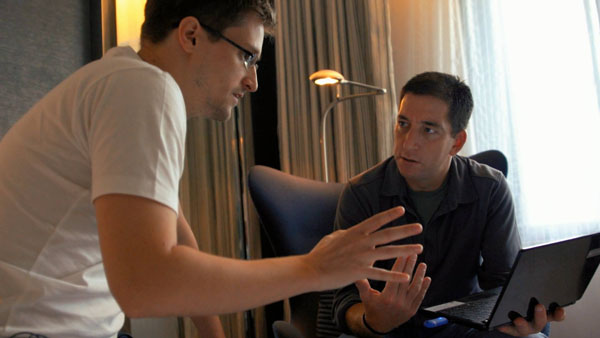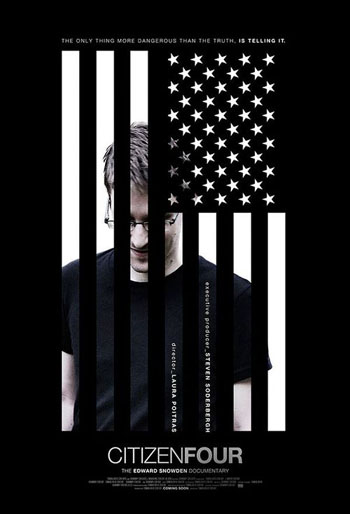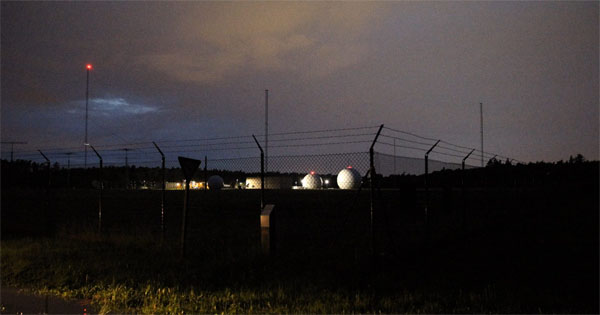“No amount of familiarity with whistleblower Edward Snowden and his shocking revelations of the U.S. government’s wholesale spying on its own citizens can prepare one for the impact of Laura Poitras’s extraordinary documentary Citizenfour,” declares Ronnie Scheib in Variety. “Far from reconstructing or analyzing a fait accompli, the film tersely records the deed in real time, as Poitras and fellow journalist Glenn Greenwald meet Snowden over an eight-day period in a Hong Kong hotel room to plot how and when they will unleash the bombshell that shook the world. Adapting the cold language of data encryption to recount a dramatic saga of abuse of power and justified paranoia, Poitras brilliantly demonstrates that information is a weapon that cuts both ways.”
The piece to read on Citizenfour is George Packer‘s for the New Yorker. Early in 2013, when Poitras was working on the third film in her projected trilogy on post-9/11 America, “Snowden wrote to Poitras, ‘You asked why I chose you. I didn’t. You chose yourself.’ He was referring to films of hers that were critical of the war on terror—in particular, a short piece on an N.S.A. whistle-blower named William Binney. That June, they met in a hotel in Hong Kong, and Poitras made and released a twelve-minute video in which Snowden introduced himself to the world.”
Packer sketches profiles of Poitras and the tight crew she’s been working with in Berlin, where he also mingles among “the German capital’s small community of surveillance expats.” He tells the stories behind Poitras’s previous films—and their consequences. Between 2006 and 2012, Poitras was detained by federal agents at least forty times as she left or entered the US. Hence the relocation. The bulk of the piece, though, traces the years-long evolution of Citizenfour from a plotless collage on surveillance into a portrait of Snowden with a clearly defined dramatic arc.
Since Friday night’s premiere at the New York Film Festival, the press has focused on two news hooks. First, Snowden’s girlfriend, Lindsay Mills, has joined him in Moscow. Glenn Greenwald, whose book No Place to Hide: Edward Snowden, the NSA, and the U.S. Surveillance State came out earlier this year, and who’s co-founded The Intercept with Poitras, argues that this revelation is not as trivial as it may seem. The US government aims “to depict whistleblowers as destined to live miserable lives,” but Snowden’s “post-Hong Kong life has been fulfilling and rewarding. He speaks, and writes, and is interviewed, and has become an important voice in the global debate he triggered. But the fact that he is now living in domestic bliss as well… should forever put to rest the absurd campaign to depict his life as grim and dank.”
The second headline-grabber is the revelation, coming right at the end of Citizenfour, that someone within the US intelligence community has begun leaking new information. “But Poitras’s decision to edit out key material to protect the new source gives the ending a quality of irresolution and anticlimax,” finds Packer. He’s not the only member of a small audience in Berlin watching what may or may not have been the final cut to voice reservations in Packer’s story. “I think it could help to have more of you,” Christoph Hochhäusler tells Poitras. “I need the consequences of all this very abstract information for people, for us, and you are our stand-in, you are our eyes.”
“Viewed in its entirety, Poitras’s trilogy can now be seen as examining three prongs of the post-9/11 world: governance, terror, and the electorate.” Ben Kenigsberg at the AV Club: “The Oscar-nominated My Country, My Country (2006) dealt with an Iraqi election; the riveting The Oath (2010) probed the paradoxes in the life of a former Al-Qaida recruiter. Citizenfour, as its title might imply, concerns the rights of citizens—or as Snowden puts it, ‘state power and the people’s ability to meaningfully oppose that power.’ Citizenfour might seem like a warmed-over news recap if Poitras didn’t know how to turn it into a bona fide movie—a stripped-down thriller worthy of Alan J. Pakula.”
For the Hollywood Reporter‘s Todd McCarthy, “no matter one’s personal stance about what Snowden did, this revelatory work is fascinating and thought-provoking, if, at the same time, oddly lacking in tension; unlike the provocations of Michael Moore or Oliver Stone, the temperature of this film is very cool. Its massive news value, which includes the bombshell suggestion that the chain of command for electronic spying goes all the way to the Oval Office, makes this one of the major and defining documentaries of recent times.”
The New Yorker‘s Jane Mayer interviewed Snowden on Saturday
“Given the passions that the NSA disclosures have generated, it’s remarkable how tempered Citizenfour comes across,” writes Spencer Ackermann in the Guardian. “Reflecting a style Poitras seems to share with Snowden, it’s a quiet movie, its soundtrack a sinister digital throb, packed tight with questions about how we live freely in an unseen dragnet.”
Poitras “delivers a mesmerizing look at both how Snowden managed to release his information as well as why it all matters,” writes Indiewire‘s Eric Kohn. Steven Zeitchik for the Los Angeles Times: “Poitras said in the [NYFF] interview that she hoped to continue following the story, and in fact may release the dozens of hours of footage from the Hong Kong hotel—in which details of the classified documents are revealed—in another form after the movie’s release. ‘It’s part of the public record. They need to get out,’ she said.”
Updates, 10/13: Citizenfour is “an electrifying countdown to an epoch-altering event,” writes Melissa Anderson for Artforum. “Despite Snowden’s insistence early on that he’s ‘not the story,’ it’s difficult not to be transfixed by every detail, no matter how seemingly banal, revealed in Citizenfour about this slight, pale, 29-year old… Taking us into that Hong Kong hotel room during that pivotal week, Poitras unforgettably shows us why Snowden was motivated to act: his belief that anyone, anywhere with a cellphone or an Internet connection was unwittingly—and illegally—the story.”
“This is the kind of film that’s unlikely to be seen by anybody who doesn’t already agree with its premise, but Citizenfour is an urgent elbow to the ribs even for those already concerned about governments that spy on their own citizens,” writes Elise Nakhnikian for Slant.
“Executive produced by Steven Soderbergh, Citizenfour moves with the meticulous motion of one of the ‘retired’ director’s genre films,” suggests Matt Patches at HitFix. “There’s a Mission: Impossible-as-Contagion vibe to Poitras’s film, as successful a global thriller as a surveillance intel compendium.”
Updates, 10/14: For those who read German, Christoph Hochhäusler, whose comments upon seeing Citizenfour for the first time appear, as mentioned above, in Packer’s article, has posted a few more thoughts. Among them: Citizenfour is a fascinating document of an “impossible” situation for a filmmaker: to remain invisible at the center of a world historical event.
For Salon‘s Andrew O’Hehir, “nothing at NYFF felt quite as consequential (to use the vocabulary word of the moment) as Citizenfour.” It’s “an urgent, gripping real-life spy story that should be seen by every American, and quite likely by everybody else too.” Further, “many of the arguments raised about Snowden’s personality and probable motivations over the past year or so fall apart when you encounter this composed and highly intelligent young man… Snowden comes across as a calm and thoughtful person who has reflected extensively on the path he has chosen and its likely consequences. He’s definitely not a naïve kid or a glory-grabbing narcissist, and any effort to smear him, in retrospect, as a Russian spy is even ludicrous.”
“I initially thought that a film which dealt more directly with [Poitras’s] personal struggles with the U.S. government would bring home the dangers of the NSA’s activities more forcefully,” writes Steven Erickson at Press Play. “But ultimately, the film she did make, which often resembles an elegantly shot spy thriller, does deliver the justified paranoia of Snowden and Greenwald’s message effectively.”
“In the dystopian Now that Snowden describes, innocuous machines conspire as listening devices, and every node of Zuckerbergian sharing invites a NSA intercept,” writes Hamza Shaban for the Baffler. “In a world of PRISM, XKeyscore, and Tempora, careful detective work is replaced with pre-emptive inference, probable cause with metadata extrapolation. These aspects of our new normal contribute to the ominous hum that hangs over the whole movie.”
Updates, 10/15: “This is a film which upturns Le Carré-style classical conceptions of fuddy-duddy political activism and affirms that the new face of the enlightened left is under 30, prodigiously clever, hyper articulate and is in possession of an acute understanding of The Enemy and their tactics.” David Jenkins at Little White Lies: “Yet, with much modern technology produced with bugs and microphones ready-implemented into the design (part of an unfathomable and far-reaching corporate conspiracy, we’re told), shady meetings in underground carparks to trade briefcases remains the safest form of communication. In essence, Citizenfour also acts as a guide for existing in a world where human beings are guilty until proven innocent and are essentially walking sources of metadata that can be handed, part and parcel, to corporate interests. The brilliant coda presents the joys of pre-digital communication while also offering a mocking satirical dialogue with anyone who might happen to be listening in.”
“Snowden’s revelations have receded in the background of the many crises and scandals that have arisen since,” notes Christopher Bourne at Twitch. ‘Citizenfour provides a valuable service in reminding us of the import of these revelations, and the chilling reality of the government’s reach into the private information not only of U.S. citizen, but of people all over the world.” It’s “a deeply unsettling viewing experience, but one that shouldn’t be missed.”
Updates, 10/16: Poitras “is too committed a journalist not to sow context through her film about what Snowdengate really meant,” writes the Telegraph‘s Tim Robey: “she shows NSA chief Keith Alexander lying to Congress about the extent of communications intercepts, gives us footage from the new facilities being custom-built for this purpose, and comes down hard on Obama for rolling ahead with the very drone and surveillance programs he had made campaign promises to curtail…. Poitras sets the whole saga on a low simmer, which lets us absorb the price we’re paying for enhanced security, while the Social Network-like score throbs away. It’s a truism now that nothing on the internet is private: to Snowden’s alarm, Poitras’s, and hopefully ours, a revolutionary technology in the widening of intellectual freedoms is being used as an all-purpose tool to shut them down.”
“It’s fantastic, edge-of-seat viewing,” writes Nigel Andrews in the Financial Times. “Half of me hates what he did, gelding the information-gathering power of the last superstate left fighting the world’s idiots, fanatics, psychos and barbarians. The other half of me is up for ideological grabs and I was pretty grabbed by Citizenfour.”
“Now activists are warning of ‘linkability,'” notes the Guardian‘s Peter Bradshaw. “In US cities, subway commuters are being asked to put their transit pass accounts on their actual credit cards. One card fits all, and also gives officialdom access to a whole lot more of your information. British cities are being encouraged to do the same thing with ‘contactless‘ cards. Maybe we all need to think again. Citizenfour is a gripping record of how our rulers are addicted to gaining more and more power and control over us—if we let them.”
“Poitras knows how to keep the narrative moving at a swift pace, how to convey all of the secrets Snowden disclosed in a quick and clear manner, and more than that, she understands that just watching Snowden and hearing his words are enough to carry much of the movie,” writes Drew Taylor at the Playlist. “While you get the sense that he’s passionate, you sense that blowing the whistle the way he did seemed like the most logical choice.”
Update, 10/17: “The film’s later chapters hop from Berlin to Brazil to Brussels and feel more dutiful than driven,” writes Time Out‘s Dave Calhoun. “And then a final, recent encounter between Snowden and Greenwald snaps us out of any complacency and reminds us that this is very much a live story, and one that will run and run and run.”
Update, 10/18: Andy Greenberg for Wired: “In the closing credits of Citizenfour, Poitras took the unusual step of adding an acknowledgment of the free software projects that made the film possible: The roll call includes the anonymity software Tor, the Tor-based operating system Tails, GPG encryption, Off-The-Record (OTR) encrypted instant messaging, hard disk encryption software Truecrypt, and Linux. All of that describes a technical setup that goes well beyond the precautions taken by most national security reporters, not to mention documentary filmmakers. Poitras argues that without those technologies, neither her reporting on the Snowden leaks nor her film itself would have been possible. In an interview ahead of the October 24th opening of Citizenfour in theaters, she talked about the importance of those crypto tools, how to make a film in the shadow of the NSA, and a new era of high-level whistleblowing.”
Update, 10/19: “John le Carré couldn’t have made this stuff up,” writes Mark Kermode in the Observer. “As with so much of her previous work, Poitras’s documentary dramatically straddles the divide between art and journalism, cinema and reportage. The trailer for Citizenfour, which warns that ‘every border you cross, every purchase you make, every call you dial… is in the hands of a system whose reach is unlimited but whose safeguards are not,’ plays it as the most chilling thriller of the year, and that’s no an idle boast; there is tension here to rival any of executive producer Steven Soderbergh’s taut dramas.”
Updates, 10/20: Poitras “had initially planned to follow The Oath with a documentary focusing on Guantanamo Bay, but as it turned out Citizenfour was the film only she could make,” writes Max Goldberg here in Keyframe. “Snowden’s own hope that his actions might embolden other insiders seems to be validated by an epilogue that already has the newswires aflutter. It’s an uncharacteristically teasing scene for Poitras, but on the whole Citizenfour remains more impressive for its lucid storytelling than its sensational scoop.”
“Given the nature of what you were getting into, did you feel compelled to resolve your affairs before leaving for Hong Kong?” David Ehrlich interviews Poitras for the Dissolve.
Updates, 10/21: “It is as if Bob Woodward had filmed his initial meeting, in a garage, with Deep Throat,” writes Steve Coll for the New Yorker. Snowden “may never have talked to a journalist, but he behaved with exceptional sophistication, both then and later—he is very far from the proverbial ‘naïve source.’ In fact, one of the least remarked upon aspects of the Snowden matter is that he has influenced journalistic practice for the better by his example as a source.”
“What kind of whistleblower hands over a digital library of extremely classified documents on a vast range of topics, shrugs his shoulders, and says, I’ll let you decide what to publish?” asks Fred Kaplan at Slate, where he notes that Jane Mayer’s asked Snowden “if any of the stories inspired by his documents went too far in divulging secrets. He replied, ‘It’s not my place’ to render judgment. That’s not true: It’s precisely his place to do that. It’s a gigantic evasion to leak however many beyond-top-secret documents he leaked—some say tens of thousands, some say millions—and then abrogate all responsibility for their circulation to the world.” Kaplan also has strong words regarding “the unavoidable issue of Snowden’s escape route.” All that said, “potential abuse is a legitimate concern. Imagine if these programs had been around when Richard Nixon was president or J. Edgar Hoover was FBI director.”
Julia Friedman for Hyperallergic: “At the premiere, I couldn’t help but wonder if we were all being monitored; Poitras, Greenwald, journalist Jeremy Scahill, and members of Snowden’s family were all present. The event seemed a likely target for enhanced NSA data flagging. While US society is still open enough that this type of film can premiere at a major festival, we now know that we live in a surveillance state. Whatever one believes Snowden’s motives to be, the information he exposed must radically change the way each of us thinks about, understands, and enacts our relationship to democracy in this country.”
“You should see this movie if you’re naïve enough to think you have a right to privacy,” writes New York‘s David Edelstein. At the Film Stage, Jordan Raup gives Citizenfour a B+. And Indiewire‘s Eric Kohn interviews Poitras (parts 1 and 2).
Updates, 10/22: “Snowden is no traitor,” argues David Auerbach at Slate. “Snowden believes in the vision that President Obama sold in 2008—liberty, transparency, populism, civil liberties, and civil rights—and seeing Obama’s failure to follow through on that vision, he decided he was ‘more willing to risk imprisonment than risk curtailing of intellectual freedom.’ If Snowden comes across as a bit of a cipher, it’s perhaps because we only see him under catastrophic stress, and his coping mechanism appears to be detachment.”
For the Dissolve‘s Scott Tobias, “the way Citizenfour underscores the entire communications apparatus leaves the deepest impression.”
“Poitras’s film is an instant, unpleasant paranoia classic,” declares Nicolas Rapold in the L.
“The film takes as its given the NSA’s perfidy and Snowden’s heroism, offering little to persuade anyone unconvinced of either,” writes Alan Scherstuhl in the Voice. “Citizenfour marvels at what it could be probing.”
Alison Willmore at Buzzfeed: “Citizenfour is a story about U.S. policies and agencies that have been exiled to international capitals and in-between spaces, like a megacity-hopping adaptation of a novel William Gibson has yet to write.”
Updates, 10/23: “There are two ways to look at Citizenfour,” suggests A.O. Scott in the New York Times. “The first and most obvious is as a piece of advocacy journalism… The second is as a movie, an elegant and intelligent contribution to the flourishing genre of dystopian allegory…. Cinema, even in the service of journalism, is always more than reporting, and focusing on what Ms. Poitras’s film is about risks ignoring what it is. It’s a tense and frightening thriller that blends the brisk globe-trotting of the Bourne movies with the spooky, atmospheric effects of a Japanese horror film. And it is also a primal political fable for the digital age, a real-time tableau of the confrontation between the individual and the state.”
Godfrey Cheshire at RogerEbert.com: “Though superlatives can mischaracterize any movie’s qualities, it is not an overstatement, I think, to call Citizenfour, Laura Poitras’s film about Edward Snowden, the movie of the century (to date)…. No film so boldly X-rays certain crucial changes wrought upon the world, and especially America and its government, by the terrorist attacks of September 11, 2001. No film so demands to be seen by every sentient person who values his or her own freedom and privacy. No film so clearly implies actions that need to be taken to prevent the 21st century from turning into an Orwellian nightmare in which technologically-enabled tyranny is absolute and true political liberty, for all intents and purposes, nonexistent.”
Craig Zobel, director of Compliance, at the Talkhouse Film: “It is rare in our current era to see someone who is so devoted to an abstract principle like liberty that they’d actually give up their life for it. This nobility makes the film at times wildly uncomfortable to watch, as if Snowden’s committing a sort of hara-kiri on screen for us.”
This “isn’t a film so much as a big fucking deal,” writes David Ehrlich at the AV Club. “Citizenfour is inextricable from its topicality in a way that no documentary has been in recent memory.” And Poitras “values Snowden for his courage, not for his celebrity, and the film’s end stretch—including the ‘bombshell’ announcement nested in its final scene—bends over backwards to deliberately diffuse the plot. This story, Poitras asserts with a small mountain of shredded paper, is not over. Not even close.”
“I’ve already heard a few colleagues talk about what an ‘important’ movie this is, and I understand where they’re coming from,” writes Tim Grierson at the Concourse. “Not simply a fascinating journalistic story about how the Snowden revelations came about, Citizenfour also wants to look at our New Normal as American citizens go through their days being monitored by the government at all times. And it’s here that I think the film lurches toward being ‘important’ rather than illuminating.”
Interviews with Poitras: Brandon Harris (Indiewire), Craig Hubert (frieze), Elvis Mitchell (KCRW, 35’22”), Andrew O’Hehir (Salon), Matt Prigge (Metro), Nicolas Rapold (Film Comment), Peter Sobczynski (RogerEbert.com) and Anne Thompson.




